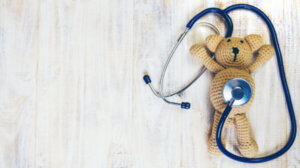Diagnosing ADHD: An Integrative Pediatricians’ View

“Medicine is a science of uncertainty and an art of probability.”
Sir Dr. William Osler (one of the great physicians of all time).
Diagnosing and treating children with ADHD is more art than science. As a Board certified pediatrician, I practiced primary care pediatrics for 15 years. For the past 25 years, to help children diagnosed with ADHD, I have integrated my mainstream background with complementary medicine.
Article continues below...
Treatment for your Child's ADHD
Download a free tip sheet "Recommended Treatment for ADHD: Medication & Behavior Management" for what's really recommended for your child or teen.
The Diagnostic Process of ADHD
With no objective lab tests, I see ADHD as a “clinical” entity. Diagnosis is based on the details of a child's attention, impulsivity, and hyperactivity.
As a medical student, pediatric resident, and pediatrician, I noticed that parents spent considerable time evaluating and worrying about their children. Since I have limited time with each patient, I learned to rely on parents' observations.
I consider parents to be my co-captain as a physician. Evaluating each child as a unique individual, listening to parents, and using my clinical judgment and common sense, has helped me effectively diagnose and treat ADHD.
The key for helping patients is in the detail of their medical history. This takes time and cannot be done in 15-minutes. (Unfortunately, our health insurance industry generally does not allow physicians the time necessary to effectively diagnose and treat ADHD.)
A comprehensive medical history includes addressing a family history of ADHD and other coexisting diagnoses, such as Depression, Bipolar Disorder and Anxiety. Details of the child's gestation, delivery, infancy, development, number of infections, and more are also critical factors.
I have seen many children whose symptoms look like ADHD, but are in fact allergy-induced, so I pay special attention to the allergy history.
- Does the child have nasal, eye, skin, or respiratory allergies?
- Is this problem in the spring/fall, or more common with seasonal change?
Is it Allergy or ADHD?
If attention, impulsivity and/or hyperactivity are increased in the Spring, then trees/grasses/molds can be the cause. If ADHD is increased in the Fall, then weeds/molds can be the underlying cause. If a child's behavioral and attention issues are worse in October/November, or March/April, with change of seasons, then molds can be the cause.
The most important question I ask:
“Is attention, impulsivity, and hyperactivity consistent everyday, or is it variable?”
If consistent, then the child probably does have ADD/ADHD, and may require medication. On the other hand if the symptoms vary, then the automatic use of a medication should be avoided.
Nutritional Influences
Nutrition can be a major problem for many children, as well. I ask for details about a child's diet. If a child craves a certain food, that food may contribute to the child's ADHD issues. The most common food triggers are:
-
- Milk (casein)
- Wheat (and other gluten foods)
- High Fructose Corn Syrup
- Soy
- Artificial flavorings, preservatives, and colorings*
After addressing allergies and nutrition, I look at supplements that might help. I have found Omega3 essential fatty acid, Zinc, DMAE, a good multivitamin, and vitamin D should be considered.
Medication and Other Interventions
I am not against the use of ADHD medication. For a number of children who do have ADHD, appropriate medication can be helpful. Medication should be considered if ADHD is consistent everyday.
However, I also believe that medication should not be the automatic first step in the treatment of attention/impulsivity/hyperactivity. I have seen many children who do not really have ADHD, but whose symptoms are allergy-induced. Allergies and food sensitivities should be evaluated.
Other interventions that can help the ADHD child include: family therapy, social skills groups, behavior modification and evaluation for Sensory Processing Disorder.
Parent support can also make a difference for the ADHD child. Coaching programs such as those offered by ImpactParents, and parent support groups (CHADD, ImpactParents and others) are valuable resources. When parents get help, they are better able to manage their child's inattention, impulsivity, and hyperactivity.
My advice for parents is this:
“It is normal to worry about your ADHD child. However, it is more helpful to be a medical detective and advocate.”
Your goal should be for your child to reach full potential with good self-esteem. There are many paths to get them there. What's your next step?

